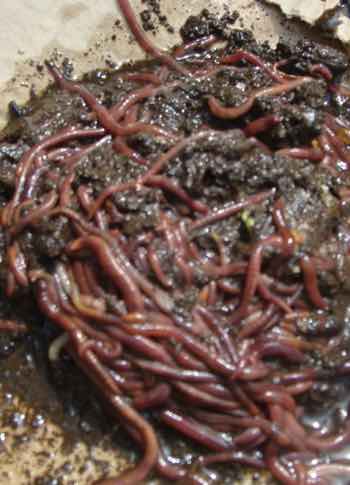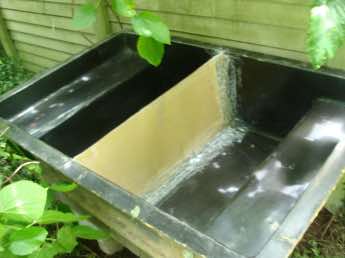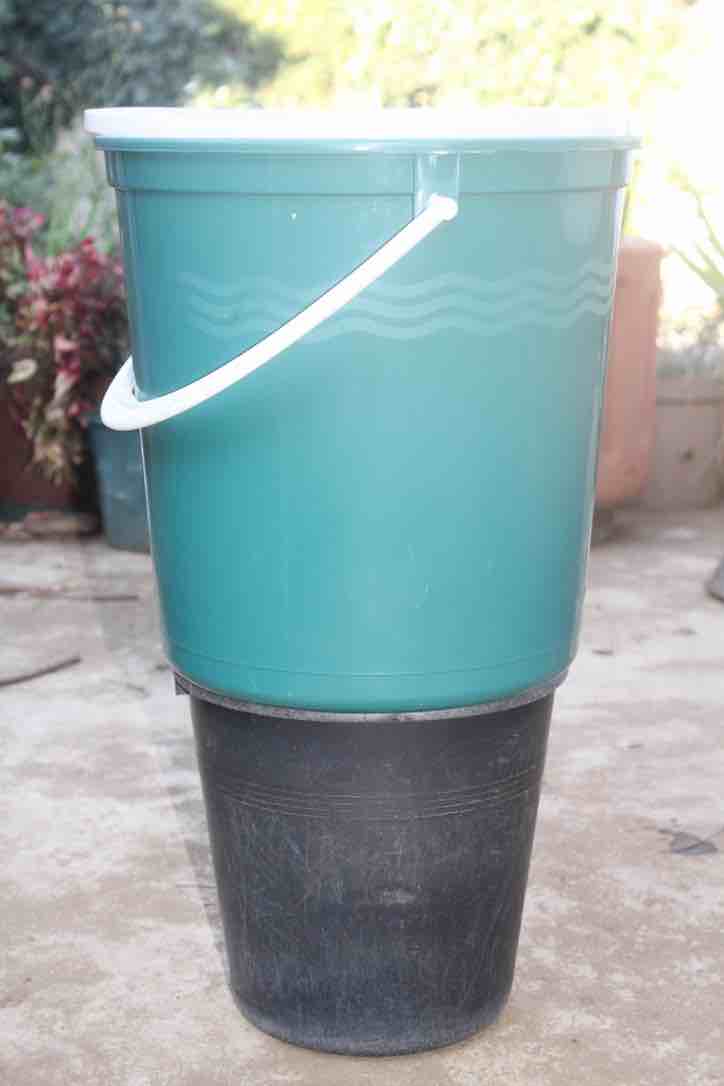- Homepage
- Worm farms
- Selling Worms
Selling worms
Selling worms is a profitable but time-consuming business. Each little creature has to be separated out and they usually are sold by either 200 or a thousand.
Personally I don't sell my worms, but I do advocate it; it is the only way to spread the good news about the huge-benefits of keeping these little nematodes.
There should be a worm farm in every garden. Once they have consumed rotting vegetable-matter they add to it the stuff that makes your vegetables grow and fruit-trees flower abundantly.

Making your avocado-tree flower and fruit every year alone makes it worth the exercise and time.
Maintaining a small worm farm is not time-consuming, nor need it cost money. Any discarded 25 litre container, or a large bucket with a lid will do.
A lid is necessary to keep rain out, and it must have a wide neck so that vegetable matter from the kitchen can easily be thrown in; if necessary just cut off the top of a plastic-drum with a hacksaw.
- Homepage
- Worm farms
- Selling Worms
You can spend quite a lot of money on a worm farm and really make a meal of it with numerous tiers; for home use, just an old plastic-drum or bucket with a lid will do. About five to ten gallons is fine.
Do not make it too large, otherwise when lifting it you may break your back. Drill holes in the bottom, and stand it on a strong bucket to collect the leachate, or worm-wee as it is often called.
Selling worms
Selling worms is gathering momentum as more folk look for the highly beneficial influence of the compost and leachate on their plants.
Another way of looking at it is that the worms will break down the vegetable matter from your kitchen in six-weeks instead of months; it hastens the process and you get beautiful humus.
However, if you are selling worms, then you will need a much larger farm. Below you can see mine; it is divided into two-halves for convenience. It is a disused fiberglass mold, with a lid that is not shown.
So, step one is to separate out the worms as above. One way is to slowly add water to your farm; they will wriggle to the surface where are they easy to collect.
Do not forget to turn the tap off or they will drown, and you will lose the lot; and, having collected them, make sure you immediately drain the liquid again; they leave behind eggs and tiny babies that you cannot see. You do not want to kill them.
Perhaps better is just to gather clumps in your fingers and estimate the number.
The material expressed on this page is gleaned from the nutritional and environmental literature; it is clearly referenced. A plain distinction is made between the author's opinion and that which is scientifically proven. When in doubt consult your health professional.
To suggest a correction or clarification, write to Dr Bernard Preston here. Contact.
I have never counted them myself, but I am reliably told that 1000 worms weigh about 500 grams.
The price obviously will vary according to your location and what the market will bear; about 20c each in South Africa, I believe.
Here you can order them from Wizzard Worms[1].

A small cardboard box with holes in the top so they can breathe, containing a little compost and your worms can then be couriered to the buyer.
This is potentially a profitable business; the worms double in number every month if the conditions are right.
So if you have a farm with 100,000 little nematodes, you could in theory gross R20,000 a month by selling worms if you could find buyers; and enough food for the hungry-critters. They eat their own weight of waste every single day.
Perhaps I should reconsider my reluctance to spend my days counting worms.
If you have an avocado tree[4], then make sure you regular pour a bucket of leachate around the trunk; it will flower and bear every year. In fact, I should develop a small mobile worm-farm on bricks that one could place under your special plants.

Useful links
When browsing use right click and Open Link in New Tab, or you may get a bad gateway signal.
Newsletter
Our newsletter is entitled "create a cyan zone" at your home, preserving both yourself and Mother Earth for future generations; and the family too, of course. We promise not to spam you with daily emails promoting various products. You may get an occasional nudge to buy one of my books.
Here are the back issues.
- Lifestyle and ideal body weight
- What are ultra-processed foods?
- Investing in long-term health
- Diseases from plastic exposure
- Intensive lifestyle management for obesity has limited value
- A world largely devoid of Parkinson's Disease
- The impact of friendly bacteria in the tum on the prevention of cancer
- There's a hole in the bucket
- Everyone is talking about weight loss drugs
- Pull the sweet tooth
- If you suffer from heartburn plant a susu
- Refined maize meal and stunting
- Should agriculture and industry get priority for water and electricity?
- Nature is calling
- Mill your own flour
- Bake your own sourdough bread
- Microplastics from our water
- Alternative types of water storage
- Wear your clothes out
- Comfort foods
- Create a bee-friendly environment
- Go to bed slightly hungry
- Keep bees
- Blue zone folk are religious
- Reduce plastic waste
- Family is important
- What can go in compost?
- Grow broad beans for longevity
- Harvest and store sunshine
- Blue zone exercise
- Harvest and store your rainwater
- Create a cyan zone at your home
Did you find this page interesting? How about forwarding it to a friendly book or food junkie? Better still, a social media tick would help.
- Homepage
- Worm farms
- Selling Worms
Address:
56 Groenekloof Rd,
Hilton, KZN
South Africa
Website:
https://www.bernard-preston.com